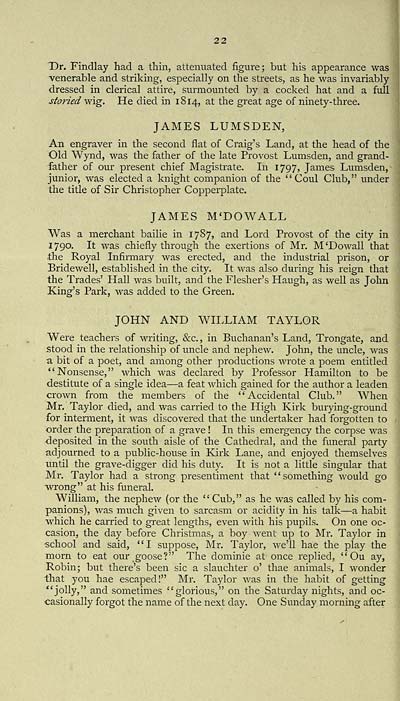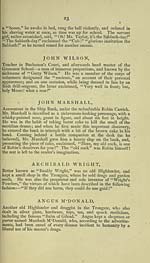Towns > Glasgow > 1787 - Reprint of Jones's directory; or, Useful pocket companion for the year 1787
(30)
Download files
Complete book:
Individual page:
Thumbnail gallery: Grid view | List view

22
X)r. Findlay had a thin, attenuated figure; but his appearance was
venerable and striking, especially on the streets, as he was invariably
dressed in clerical attire, surmounted by a cocked hat and a full
sto7'ied ^'ig. He died in 1814, at the great age of ninety- three.
JAMES LUMSDEN,
An engraver in the second flat of Craig's Land, at the head of the
Old Wynd, was the father of the late Provost Lumsden, and grand-
father of our present chief Magistrate. In 1797, James Lumsden,
junior, was elected a knight companion of the " Coul Club," under
the title of Sir Christopher Copperplate.
JAMES M'DOWALL
Was a merchant bailie in 1787, and Lord Provost of the city in
1790. It was chiefly through the exertions of Mr. M'Dowall that
•the Royal Infirmary was erected, and the industrial prison, or
Bridewell, established in the city. It was also during his reign that
the Trades' Hall was built, and the Flesher's Haugh, as well as John
King's Park, was added to the Green.
JOHN AND WILLIAM TAYLOR
Were teachers of writing, «&c. , in Buchanan's Land, Trongate, and
stood in the relationship of tmcle and nephew. John, the uncle, was
a bit of a poet, and among other productions wrote a poem entitled
"Nonsense," which was declared by Professor Hamilton to be
destitute of a single idea — a feat Avhich gained for the author a leaden
crown from the members of the "Accidental Club." When
Mr. Taylor died, and was carried to the High Kirk buiying-ground
for interment, it was discovered that the undertaker had forgotten to
order the preparation of a grave ! In this emergency the corpse was
-deposited in the south aisle of the Cathedral, and the funeral party
adjourned to a public-house in Kirk Lane, and enjoyed themselves
tmtil the grave-digger did his dvity. It is not a little singular that
Mr. Taylor had a sti-ong presentiment that "something would go
wrong" at his funeral.
William, the nephew (or the "Cub," as he was called by his com-
panions), was much given to sarcasm or acidity in his talk — a habit
which he carried to great lengths, even with his pupils. On one oc-
casion, the day before Christmas, a boy went up to Mr. Taylor in
-school and said, "I suppose, Mr. Taylor, we'll hae the play the
morn to eat our goose?" The dominie at once replied, " Ou ay,
Robin; but there's been sic a slauchter o' thae animals, I wonder
that you hae escaped!" Mr. Taylor was in the habit of getting
*' jolly," and sometimes "glorious," on the Saturday nights, and oc-
casionally forgot the name of the next day. One Sunday morning after
X)r. Findlay had a thin, attenuated figure; but his appearance was
venerable and striking, especially on the streets, as he was invariably
dressed in clerical attire, surmounted by a cocked hat and a full
sto7'ied ^'ig. He died in 1814, at the great age of ninety- three.
JAMES LUMSDEN,
An engraver in the second flat of Craig's Land, at the head of the
Old Wynd, was the father of the late Provost Lumsden, and grand-
father of our present chief Magistrate. In 1797, James Lumsden,
junior, was elected a knight companion of the " Coul Club," under
the title of Sir Christopher Copperplate.
JAMES M'DOWALL
Was a merchant bailie in 1787, and Lord Provost of the city in
1790. It was chiefly through the exertions of Mr. M'Dowall that
•the Royal Infirmary was erected, and the industrial prison, or
Bridewell, established in the city. It was also during his reign that
the Trades' Hall was built, and the Flesher's Haugh, as well as John
King's Park, was added to the Green.
JOHN AND WILLIAM TAYLOR
Were teachers of writing, «&c. , in Buchanan's Land, Trongate, and
stood in the relationship of tmcle and nephew. John, the uncle, was
a bit of a poet, and among other productions wrote a poem entitled
"Nonsense," which was declared by Professor Hamilton to be
destitute of a single idea — a feat Avhich gained for the author a leaden
crown from the members of the "Accidental Club." When
Mr. Taylor died, and was carried to the High Kirk buiying-ground
for interment, it was discovered that the undertaker had forgotten to
order the preparation of a grave ! In this emergency the corpse was
-deposited in the south aisle of the Cathedral, and the funeral party
adjourned to a public-house in Kirk Lane, and enjoyed themselves
tmtil the grave-digger did his dvity. It is not a little singular that
Mr. Taylor had a sti-ong presentiment that "something would go
wrong" at his funeral.
William, the nephew (or the "Cub," as he was called by his com-
panions), was much given to sarcasm or acidity in his talk — a habit
which he carried to great lengths, even with his pupils. On one oc-
casion, the day before Christmas, a boy went up to Mr. Taylor in
-school and said, "I suppose, Mr. Taylor, we'll hae the play the
morn to eat our goose?" The dominie at once replied, " Ou ay,
Robin; but there's been sic a slauchter o' thae animals, I wonder
that you hae escaped!" Mr. Taylor was in the habit of getting
*' jolly," and sometimes "glorious," on the Saturday nights, and oc-
casionally forgot the name of the next day. One Sunday morning after
Set display mode to: Large image | Transcription
Images and transcriptions on this page, including medium image downloads, may be used under the Creative Commons Attribution 4.0 International Licence unless otherwise stated. ![]()
| Scottish Post Office Directories > Towns > Glasgow > Reprint of Jones's directory; or, Useful pocket companion for the year 1787 > (30) |
|---|
| Permanent URL | https://digital.nls.uk/85272159 |
|---|
| Description | Directories of individual Scottish towns and their suburbs. |
|---|
| Description | Around 700 Scottish directories published annually by the Post Office or private publishers between 1773 and 1911. Most of Scotland covered, with a focus on Edinburgh, Glasgow, Dundee and Aberdeen. Most volumes include a general directory (A-Z by surname), street directory (A-Z by street) and trade directory (A-Z by trade). |
|---|


